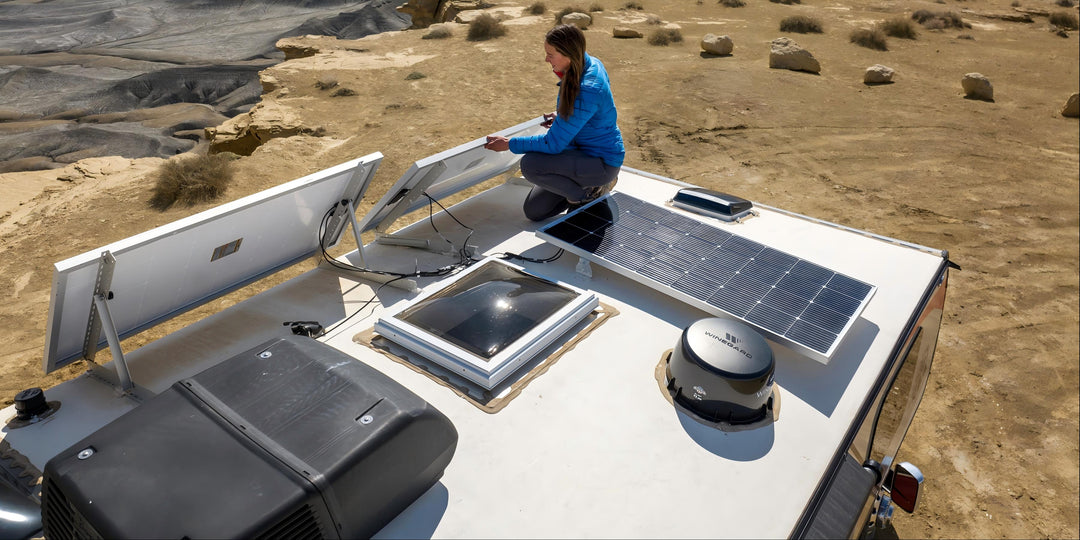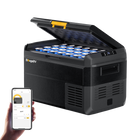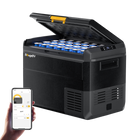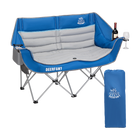How to Clean Solar Panels: A Detailed Solar Panel Cleaning Guide

If you're using solar panels, you've probably felt the joy of utilizing solar energy. Solar panels are a fantastic way to stay off-grid and eco-friendly, whether you're camping in the wilderness, cruising on open waters, or living sustainably in your off-grid tiny home. But to keep your solar panels performing at their best, solar panel cleaning is essential. Dirty panels can reduce efficiency, meaning less power for your adventures.
In this blog, we’ll walk you through solar panel cleaning, what to avoid, and some specific tips for keeping your panels in top shape for RVs, boats, and tiny houses. Additionally, we’ll point you to additional resources, including our solar panel maintenance guide, and highlight our range of high-quality solar panels designed for your off-grid lifestyle. Let’s dive in!
Do Solar Panels Need To Be Cleaned?
Solar panels work by converting sunlight into electricity, but when dirt, dust, bird droppings, or even leaves cover the surface, they block sunlight and reduce efficiency. On average, dirty panels can lose 5–20% of their energy output.
What’s more, regular solar panel cleaning not only maximizes energy production but also extends their lifespan. A little maintenance goes a long way in keeping your solar investment working for years to come.
How Often Should Solar Panels Be Cleaned?
The frequency of solar panel cleaning depends on your environment. If you’re in a dusty desert, near salty ocean air, or under trees where bird droppings are common, you may need to clean your panels more often—about once a month. For less extreme conditions, a cleaning every 2–3 months should suffice.
Pro Tip: Regularly inspect your panels for dirt buildup or shading issues, particularly after storms or Long-distance travels.
Step-by-Step Guide to Solar Panel Cleaning

Here’s how to safely and effectively perform solar panel cleaning:
1. Turn Off the System
Before cleaning, please turn off your solar panel system to avoid any electrical hazards. Safety first!
2. Choose the Right Time
Clean your panels early in the morning or late in the afternoon when they’re cool. Cleaning hot panels can cause thermal shock, which may damage the glass.
3. Rinse Off Loose Dirt
Use a hose with a gentle spray to remove loose dirt, dust, and debris. Avoid high-pressure washers, which can damage the panel surface or seals.
4. Use a Soft Sponge or Brush
For stubborn dirt, use a soft sponge, microfiber cloth, or a brush with soft bristles. Avoid abrasive materials that could scratch the glass.
5. Mix a Mild Cleaning Solution
A simple mix of water and a small amount of dish soap works well. Avoid harsh chemicals, including ammonia or alcohol-based cleaners, as they can damage the anti-reflective coating.
6. Scrub Gently
Gently scrub the surface of the panels, focusing on areas with visible dirt or grime. Don’t forget the edges!
7. Rinse Thoroughly
Rinse off any soap residue with clean water. Residue can leave streaks or attract more dirt over time.
8. Dry with a Soft Cloth
Use a soft, lint-free cloth to dry the panels. This step helps prevent water spots and ensures a streak-free finish.
What to Avoid When Cleaning Solar Panels
To keep your panels in great shape, here are a few things to steer clear of during solar panel cleaning:
High-pressure washers: These can damage the panel’s surface or seals.
Abrasive sponges or brushes: Scratches can reduce efficiency and damage the glass.
Harsh chemicals: Stick to mild soap and water to protect the anti-reflective coating.
Cleaning in direct sunlight: Panels can get extremely hot, making cleaning unsafe and less effective.
Cleaning Tips for RV, Boat, and Tiny House Solar Panels

Now, let’s get specific! Depending on where and how you use your solar panels, here are some tailored solar panel cleaning tips:
For RV Solar Panels
Dust and Road Grime: During long drives, RV panels tend to accumulate dust and grime. Giving them a quick rinse at the end of your trip can help prevent buildup.
Portable Panels: If you’re using portable solar panels, such as our BougeRV Portable Solar Panels, cleaning is even easier—just prop them up and wipe them down!
Storage: If your RV will be stored for an extended period, clean the panels both before and after storage to ensure optimal efficiency.
For Boat Solar Panels
Saltwater Residue: Salt spray can accumulate on panels, reducing efficiency. Rinse with fresh water after every trip to prevent salt buildup.
Corrosion Prevention: Pay attention to the edges and frames of your panels to ensure there’s no corrosion from the salty environment.
Stability: When cleaning panels on a moving boat, prioritize safety. Clean the panels when the boat is docked or in calm waters.
For Tiny House Solar Panels
Tree Debris: If your tiny house is near trees, take care of leaves, sap, or bird droppings. Regular solar panel cleaning will keep these from accumulating.
Roof Access: To safely access roof-mounted panels, use a sturdy ladder or a cleaning tool with an extended handle.
Seasonal Maintenance: In snowy climates, clear snow off panels during winter to keep them generating power.
Final Thoughts
Cleaning your solar panels doesn’t have to be a daunting task. With a little effort and the right techniques for solar panel cleaning, you can keep your panels running efficiently and enjoy all the energy you need for your adventures. Whether you’re camping in your RV, sailing on your boat, or living sustainably in a tiny house, clean panels mean more power for the things that matter most.
Got any questions or tips of your own? Share them in the comments below! And don’t forget to check out our solar panel maintenance guide for more insights, or browse our solar panels collections to upgrade your system today.
What’s more: You can use the code SEOBV5 at checkout and enjoy an extra 5% off your purchase! Hurry up—this deal won’t last forever! Happy adventuring, and may your panels always shine bright!
FAQs
1. Do I need to clean my solar panels after it rains?
Rain can help rinse off some dirt and dust, but it’s not a substitute for solar panel cleaning. Rainwater often leaves mineral deposits or streaks on the panels, especially in areas with hard water. After a rainstorm, it’s a good idea to inspect your panels and give them a quick clean if you notice any residue.
2. Can I walk on my solar panels to clean them?
Most solar panels are not built to support the weight of a person, as walking on them can lead to cracks, microfractures, or other damage that may compromise their efficiency. However, our CIGS flexible solar panels are built differently! They are highly durable and can even withstand the weight of a person walking on them, making cleaning more convenient and worry-free.
3. What if my solar panels are still not producing enough power after cleaning?
If your panels are clean but you’re still experiencing reduced efficiency, it could be due to other factors. Check for:
Shading: Ensure there are no trees, buildings, or other obstructions casting shadows on your panels.
Wiring or connection issues: Inspect the wiring and connectors for any signs of damage or loose connections.
Panel damage: Look for cracks, chips, or discoloration on the panel surface. If you’re unable to identify the issue, consider consulting a professional technician with your solar panel provider for support.
























































































































































































